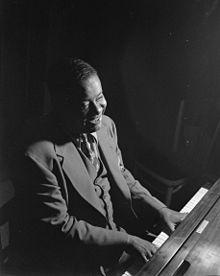Art Tatum
| Art Tatum | |
|---|---|

Tatum in about May 1946
|
|
| Background information | |
| Birth name | Arthur Tatum, Jr. |
| Born |
October 13, 1909 Toledo, Ohio, United States |
| Died | November 5, 1956 (aged 47) Los Angeles, United States |
| Genres | Jazz, stride |
| Occupation(s) | Musician |
| Instruments | Piano |
| Years active | 1927–1956 |
| Labels | Brunswick, Decca, Stinson, Verve, Folkways |
Arthur "Art" Tatum, Jr. (/ˈteɪtəm/, October 13, 1909 – November 5, 1956) was an American jazz pianist.
Tatum is widely acknowledged as the greatest jazz pianist of all time, and was a major influence on later generations of jazz pianists. He was hailed for the technical proficiency of his performances, which set a new standard for jazz piano virtuosity. Critic Scott Yanow wrote, "Tatum's quick reflexes and boundless imagination kept his improvisations filled with fresh (and sometimes futuristic) ideas that put him way ahead of his contemporaries."
For a musician of such stature, there is little published information available about Tatum's life. Only one full-length biography has been published, Too Marvelous for Words (1994), by James Lester. Lester interviewed many of Tatum's contemporaries for the book and drew from many articles published about him.
Tatum was born in Toledo, Ohio. His father, Arthur Tatum, Sr., was a guitarist and an elder at Grace Presbyterian Church, where his mother, Mildred Hoskins, played piano. He had two siblings, Karl and Arlene. From infancy he suffered from cataracts (of disputed cause) which left him blind in one eye and with only very limited vision in the other. A number of surgical procedures improved his eye condition to a degree but some of the benefits were reversed when he was assaulted in 1930.
A child with perfect pitch, Tatum learned to play by ear, picking out church hymns by the age of three, learning tunes from the radio and copying piano roll recordings his mother owned. In a Voice of America interview, he denied the widespread rumor that he learned to play by copying piano roll recordings made by two pianists. He developed a very fast playing style, without losing accuracy. As a child he was also very sensitive to the piano's intonation and insisted it be tuned often. While playing piano was the most obvious application of his mental and physical skills, he also had an encyclopedic memory for Major League Baseball statistics.
...
Wikipedia
